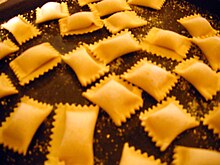Agnolotti (Italian: [aɲɲoˈlɔtti]; Piedmontese: agnolòt, Piedmontese: [aɲʊˈlɔt]; sg.: agnolotto) is a type of stuffed pasta typical of the Piedmont region of Italy, made with small pieces of flattened dough folded over a filling of roasted meat[1] or vegetables. Agnolotti can be di magro or di grasso depending on their filling of vegetables or meat.[2]
 | |
| Alternative names | Piat d'angelòt, agnellotti, agnolòt, langaroli, langheroli |
|---|---|
| Type | Pasta |
| Place of origin | Italy |
| Region or state | Piedmont |
| Main ingredients | Pasta dough, beef, vegetables |

Although their primitive shape was semi-circular, traditionally agnolotti are of a square shape with sides of about one or two inches. However, they can also be of a smaller, rectangular shape when they are called "agnolotti al plin". Plin means 'a pinch', because one pinches with thumb and forefinger between each mound of filling to close and seal the little pasta packets. Agnolotti al plin are almost always stuffed with meat.[3]
The dish is not to be confused with Piacenza's stuffed pasta pockets called anolini.
History
According to a legend, the origin of the name may come from a cook called Angiolino, or "Angelot", an individual from Montferrat who is said to be the inventor of the recipe.[2]
Preparation
Agnolotti are prepared by immersion in boiling water. Typically, they are dressed with beef broth and a little melted butter or in a fresh sage and melted butter sauce, as a complex sauce would detract from the flavours in the agnolotti pockets. In both cases they may be topped with Parmesan cheese, but no cheese is contained within agnolotti.
One of the traditional ways to serve agnolotti del plin is to dump them onto a napkin after draining the pasta water and serve them dry with no condiment; this is reminiscent of the habit of farmers to bring food wrapped in napkins to consume during the workday.
Variations
In the Montferrat region of Italy, located within Piedmont, a special version of agnolotti is prepared with a donkey meat filling.[1] Robiola cheese is another popular ingredient in Piedmont.
Other variations:
See also
References
- ^ a b De Vita, O.Z. (2009). Encyclopedia of Pasta. California Studies in Food and Culture. University of California Press. p. 31. ISBN 978-0-520-94471-8. Retrieved November 5, 2016.
- ^ a b Hildebrand, Caz (2011). Géométrie de la pasta. Kenedy, Jacob., Salsa, Patrice. Paris: Marabout. p. 16. ISBN 9782501072441. OCLC 762599005.
- ^ Hildebrand, Caz; Kenedy, Jacob (2011). Géométrie de la pasta. Patrice Salsa (translation). Paris: Marabout. p. 20. ISBN 9782501072441. OCLC 762599005.
- ^ "Giallo Zafferano".
- ^ "Cook Around".
- ^ "Cook Around".
External links
- Lang, Jenifer Harvey, ed. (1988). "Agnolotti". Larousse Gastronomique: The New American Edition of the World's Greatest Culinary Encyclopedia. New York: Crown Publishers. ISBN 0517570327. OCLC 777810992.